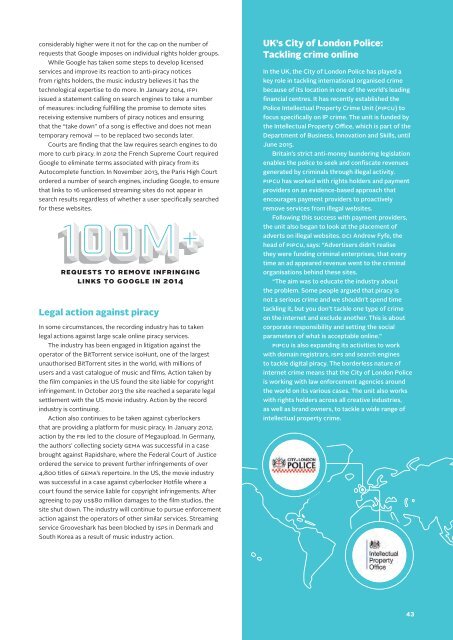Digital-Music-Report-2014
Digital-Music-Report-2014
Digital-Music-Report-2014
- No tags were found...
You also want an ePaper? Increase the reach of your titles
YUMPU automatically turns print PDFs into web optimized ePapers that Google loves.
considerably higher were it not for the cap on the number ofrequests that Google imposes on individual rights holder groups.While Google has taken some steps to develop licensedservices and improve its reaction to anti-piracy noticesfrom rights holders, the music industry believes it has thetechnological expertise to do more. In January <strong>2014</strong>, IFPIissued a statement calling on search engines to take a numberof measures: including fulfilling the promise to demote sitesreceiving extensive numbers of piracy notices and ensuringthat the “take down” of a song is effective and does not meantemporary removal — to be replaced two seconds later.Courts are finding that the law requires search engines to domore to curb piracy. In 2012 the French Supreme Court requiredGoogle to eliminate terms associated with piracy from itsAutocomplete function. In November 2013, the Paris High Courtordered a number of search engines, including Google, to ensurethat links to 16 unlicensed streaming sites do not appear insearch results regardless of whether a user specifically searchedfor these websites.100M+requests to remove infringinglinks TO GOOGLE in <strong>2014</strong>Legal action against piracyIn some circumstances, the recording industry has to takenlegal actions against large scale online piracy services.The industry has been engaged in litigation against theoperator of the BitTorrent service isoHunt, one of the largestunauthorised BitTorrent sites in the world, with millions ofusers and a vast catalogue of music and films. Action taken bythe film companies in the US found the site liable for copyrightinfringement. In October 2013 the site reached a separate legalsettlement with the US movie industry. Action by the recordindustry is continuing.Action also continues to be taken against cyberlockersthat are providing a platform for music piracy. In January 2012,action by the FBI led to the closure of Megaupload. In Germany,the authors’ collecting society GEMA was successful in a casebrought against Rapidshare, where the Federal Court of Justiceordered the service to prevent further infringements of over4,800 titles of GEMA’s repertoire. In the US, the movie industrywas successful in a case against cyberlocker Hotfile where acourt found the service liable for copyright infringements. Afteragreeing to pay US$80 million damages to the film studios, thesite shut down. The industry will continue to pursue enforcementaction against the operators of other similar services. Streamingservice Grooveshark has been blocked by ISPs in Denmark andSouth Korea as a result of music industry action.UK’s City of London Police:Tackling crime onlineIn the UK, the City of London Police has played akey role in tackling international organised crimebecause of its location in one of the world’s leadingfinancial centres. It has recently established thePolice Intellectual Property Crime Unit (PIPCU) tofocus specifically on IP crime. The unit is funded bythe Intellectual Property Office, which is part of theDepartment of Business, Innovation and Skills, untilJune 2015.Britain’s strict anti-money laundering legislationenables the police to seek and confiscate revenuesgenerated by criminals through illegal activity.PIPCU has worked with rights holders and paymentproviders on an evidence-based approach thatencourages payment providers to proactivelyremove services from illegal websites.Following this success with payment providers,the unit also began to look at the placement ofadverts on illegal websites. DCI Andrew Fyfe, thehead of PIPCU, says: “Advertisers didn’t realisethey were funding criminal enterprises, that everytime an ad appeared revenue went to the criminalorganisations behind these sites.“The aim was to educate the industry aboutthe problem. Some people argued that piracy isnot a serious crime and we shouldn’t spend timetackling it, but you don’t tackle one type of crimeon the internet and exclude another. This is aboutcorporate responsibility and setting the socialparameters of what is acceptable online.”PIPCU is also expanding its activities to workwith domain registrars, ISPs and search enginesto tackle digital piracy. The borderless nature ofinternet crime means that the City of London Policeis working with law enforcement agencies aroundthe world on its various cases. The unit also workswith rights holders across all creative industries,as well as brand owners, to tackle a wide range ofintellectual property crime.43


